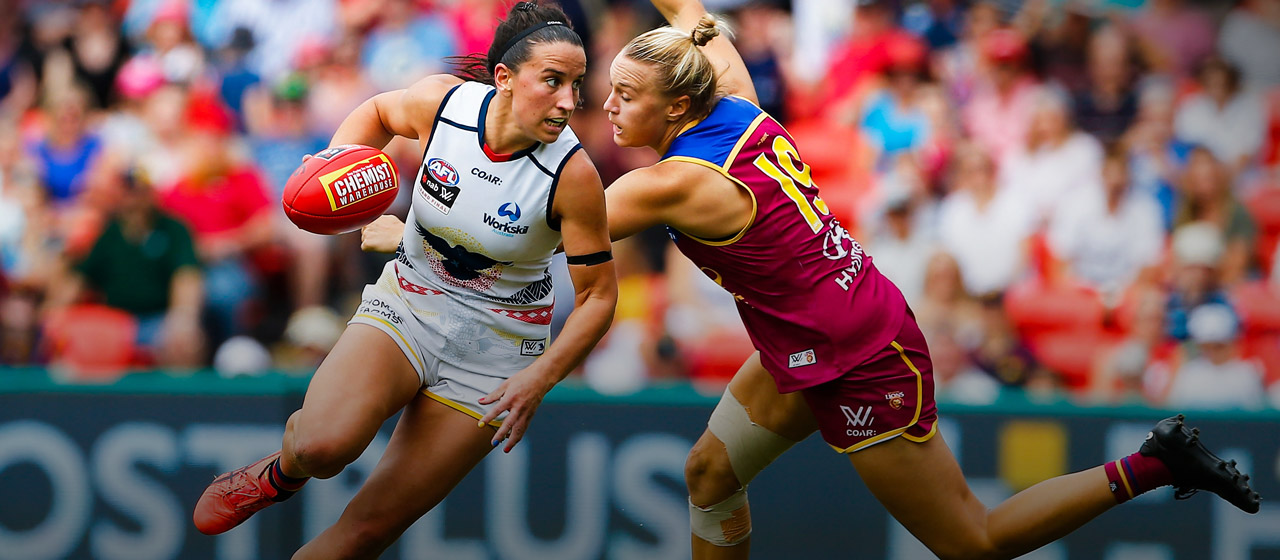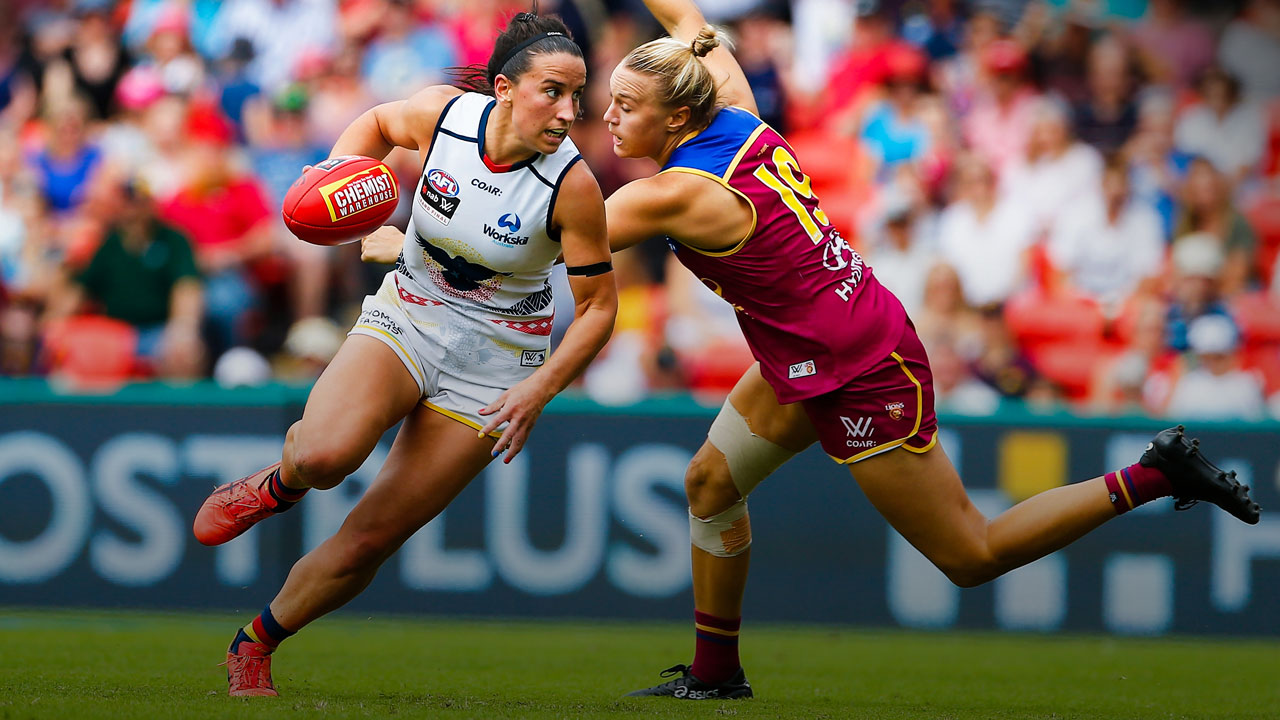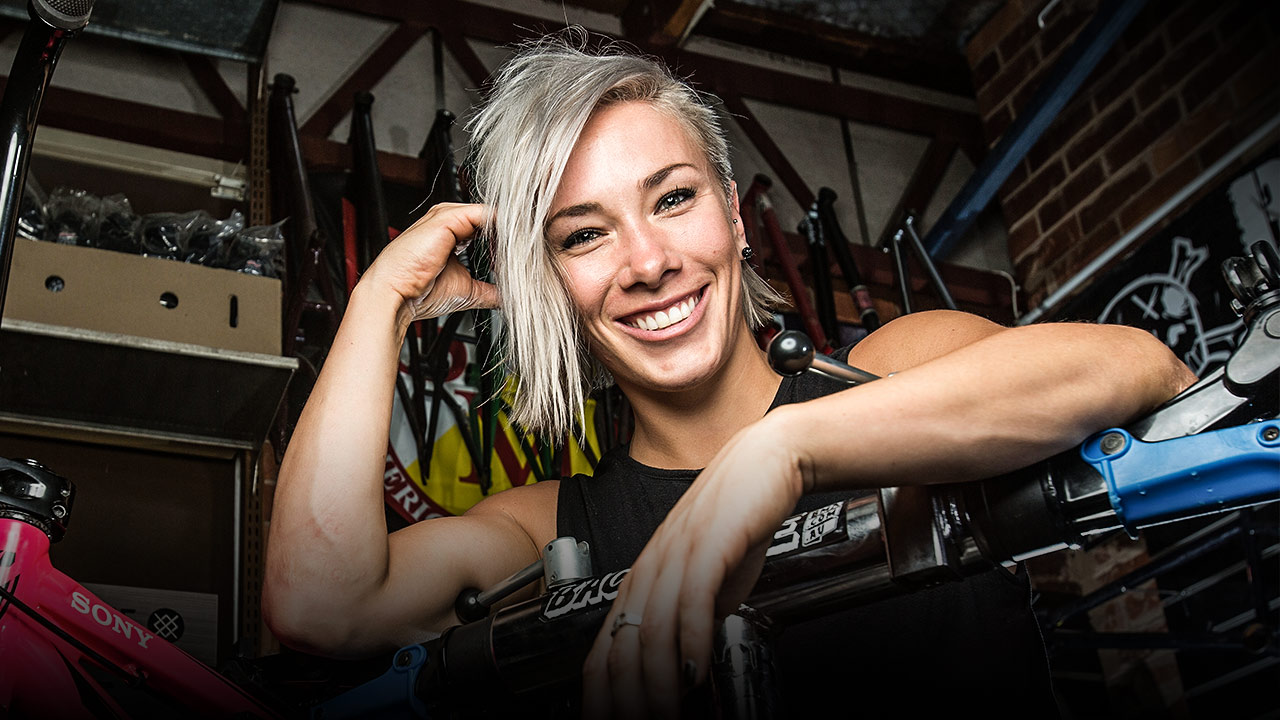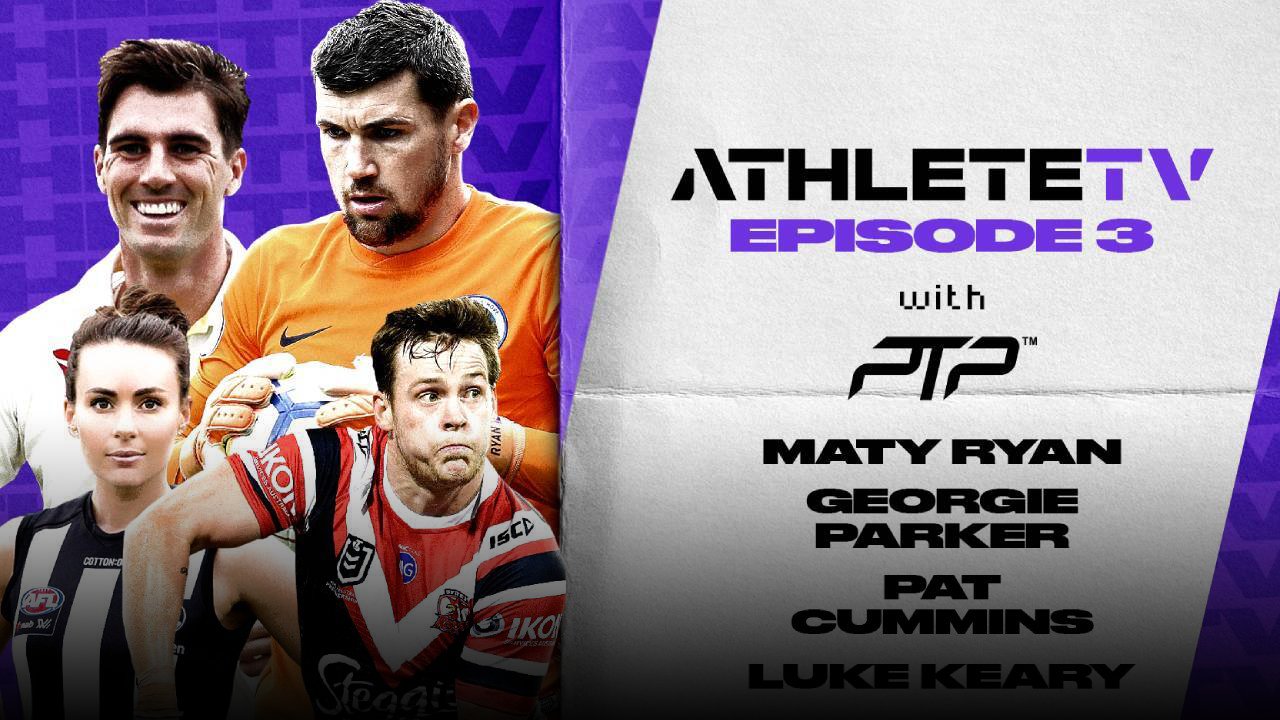AFLW
Dreaming big on the 3am veggie shift
I had to get hit by a car to get a new bike.
I was still at school, and winning state road and criterium titles using my dad’s hand-me-down bike. So it was worth the concussion and the grazes to get the insurance payout for a replacement.
It still wasn’t as good as other people’s, because my original bike wasn’t worth much. But it was a new bike. And it was my bike.
My family has always struggled a bit financially. I have three brothers, and my mum was a stay-at-home mum, which was fantastic, but it did mean that resources were stretched. My dad worked as a barman, and then in the local IGA in Minlaton on the Yorke Peninsula, which is where we lived before we moved to Adelaide to support us kids with our futures, but in particular my sport. Mum and dad work together as cleaners now. My dad was Australian skateboard champion back in the day and my mother went back and finished off her year 12 schooling online while we were young.
My family has always been into sport together – we would get up as a family and run laps around the local oval, or ride our bikes around the local bike tracks as a family before school. This is where my motivation for sport and exercise stemmed from.
Growing up, any spare money we had went to my sport. There were so many times in my life I got selected for teams and then the next step was, ‘Oh, can my parents afford to pay for me to go?’ I always felt like I had to try super, super hard because nothing ever came easy.
At the time I did think, ‘Gosh, this is tough,’ but now when I look back on everything I see it’s really helped me become a strong person.
At one stage, I even thought about playing in the Lingerie Football League. They were going to bring it to Australia, so a mate contacted me about it and I went for a few training sessions. That’s how eager, how desperate, I was for a sport I could afford to play at the elite level, that I even thought about doing it in my underwear.
I didn’t go on ahead with it, because I wanted to focus on footy at the time, which I’m very glad about now!
I never imagined there’d be a day I’d get paid to play sport. I would have done it for nothing. I’m so used to doing it for no income. Getting any money, or even a free pair of boots, is just amazing to me.
I think longer term, we should all be fighting towards equality in pay in comparison to male athletes, but I do get a bit surprised when I hear some of the younger girls saying, ‘I didn’t get this, or that’. At this stage, I am grateful for anything! Coming from cycling where equipment can make such a big difference, I love it that all you need in footy is a pair of boots, and when you get that supplied for you I’m just like, ‘I’m set!’
CYCLING & PACKING VEGGIES
I played hockey and basketball and netball growing up, and then my parents put the tough word on me, ‘We can’t afford for you to play all three’. I had to pick one, so I picked hockey.
I was in state teams and played above my age a lot of the time, which gave me a steep learning curve. My parents were travelling up to 1000km a week to get me to state and club training and games. We’d drive the 200km to Adelaide and back again twice every weekend, and sometimes one morning during the week as well.
We had a tiny little Daihatsu, so dad would drive, and my older brother would be in the front because he had the longest legs, and then there’d be four of us in the back. My mum would go without a seatbelt – I’m not sure, but I think the ruling then was that as long as all the seatbelts were in use that was OK – and we’d drive for two hours each way just so I could play sport.
We moved to Adelaide when I was in year nine, for my hockey, and for school for my brothers, and dad had some work opportunities in the city – plus, we were driving there all the time, anyway. In that same year, I got selected to do a SASI talent search identification program for cycling, and I ended up making the change.
I won two state championships and went away to nationals for track cycling, and then I got selected for the Australian Youth Olympic Festival in Sydney in 2007, which was a really good experience. But I was renting a plain track bike and a lot of the other people had high-end equipment. It’s hard to look across at an opponent with an aerodynamic helmet and disc wheels that you’ve heard can take up to six seconds off your pursuit time.
Even when I got to Sydney, the Australian coach said, ‘You have road cranks on your track bike?’ I just replied, ‘I just get what I’m given, because we can’t afford it’. My parents had caught a plane over to watch me, but they’d brought bikes to ride everywhere and were staying in a tent in a caravan park to make it affordable for them.
When I was in year 11, my parents and a few teachers asked me what I wanted to get out of life. At that stage, women’s cycling wasn’t really a viable career path. You were just forking out money all the time and my parents said, ‘You’ve got a future of being in debt to follow your dreams or you can have a real go at school,’ so I thought I would take the year off cycling for year 12 to really focus on my studies. And I did well. I got into a university course to be a PE teacher.
It was a tough decision and definitely one that upset me as I couldn’t afford to do both. I’d see my friends taking a year off just to cycle, whereas I was torn about what to do. I missed the competitiveness of being an elite athlete, so I deferred after my first year of uni and decided I’d get back into cycling with a part-scholarship at the SASI. I had to pay my way, so I got a job packing veggies at the markets, starting at 3am.
It was very challenging. Everyone else in the program would train together, but I’d train by myself. I’d ride to work at 2am, do my eight or more-hour shift, and then go for a 60-100km ride before I went home. That didn’t last too long – not when none of the competition was working. At least not full-time.
I remember my coach telling me I would have to fund myself to travel to a minimum of five competitions a year to get noticed at a national level. And the equipment was so expensive. The writing was on the wall. I just thought, ‘I can’t compete. I can’t compete at nationals against people with $15,000-to-$20,000 bikes’.
There were so many times in my life I got selected for teams and then the next step was, ‘Oh, can my parents afford to pay for me to go?’ I always felt like I had to try super, super hard because nothing ever came easy.
It was a really hard day for me. I remember crying and just thinking, ‘Now I’m nothing. Without cycling I’m just this person who packs vegetables at three o’clock in the morning at the markets, all that hard work and training and I feel like I’ve amounted to nothing’.
I also felt guilty, as my brothers and parents had given up so much to support me. On top of these setbacks I was also challenged with health issues, one example being a rare disease that effected my heart called Kawasaki Syndrome. This saw me in a wheelchair for weeks and eventually hospitalised during diagnosis. I still have some ill effects from this now and don’t think my body has ever completely recovered.
There have been lots of obstacles along the way, but it has helped with me being able to give advice with my personal training/wellness business I run, which is called Gratitude Over Attitude. At the time, I would have traded all those experiences – no, actually, I would have sold them! – but now whatever life throws at me, I know I’ll find a way.
My experience gives me a lot of confidence in my ‘sweat equity’ as well. I tell a lot of my clients, ‘It doesn’t matter what you’re working on right now. Just keep working hard and let life unfold for you,’ because, for instance, the work I put into hockey and cycling has helped make me the athlete I am today.
‘YOU’VE FINALLY DONE IT’
I played some premier league soccer before I tried footy, and my coach said, ‘We’ll get you a trial with Adelaide United,’ but I just didn’t have the desire. I was grumpy and upset with life and just wanted to get out on my own, so I moved out of home when I was 19.
I was still packing veggies full-time and I was constantly tired and I just got to the point of, ‘Where does this take me, and what do I get out of it considering how much I have to put in?’
So I walked away from sport altogether for a while. Then somewhere in there, my mate asked me to fill in for her football team, Ingle Farm. I’d thought about it when I was at uni but there were only three teams in SA at the time and I thought, ‘Nah, it’s not serious enough, if I do sport I want to do it properly’.
But this time when my mate asked me, after everything, I thought, ‘I just want to have fun with sport now and enjoy it.’
At my first training session, I was so bad! I kicked the ball and I was like, ‘Why doesn’t this go straight? This is ridiculous’. Normally I just pick up a sport straight away. Not this one.
They didn’t need me for the first game and the second week I started on the bench, when one of our players got injured. When she was coming off, the coach said, ‘Jess, you’re on. You’re on the ball’. And I was yelling as I ran out there, ‘What’s on the ball? I don’t know what that means!’.
But I’ve always kept my fitness up, so in that game I just ran and ran and ran, I just chased the ball around, and afterwards they were all like, ‘What the hell? You did such a great job’. They actually nicknamed me Junkyard Dog. Funnily enough, I didn’t understand what that meant, either.
I loved the tackling and the physicality of it. I couldn’t bounce the ball or anything but I’d just get in there and get it. My kicking and handball wasn’t pretty, and I couldn’t really mark, either, but I ran a lot and I got the ball a lot. I kept playing because I loved it. I had no idea at that stage of what was to come.
Bringing the start of AFLW forward to 2017 was good timing for me. I’d had a big enough break from elite sport and was really keen to get back into it. I remember draft day so well. I sat down with my parents in my little apartment and we streamed it on a laptop.
When the Crows selected me at No.119, I was shocked. It felt like all those years of time and effort and stressing about money were worth it.
I’m not a crier, but I started to tear up. My mum jumped up in the air screaming and my dad grabbed my shirt and started shaking me, saying, ‘You’ve done it, you’ve finally done it’. He’s been a massive, massive support for me. He’s the type of dad that would come to every game and training. He watches our home games now and then gets home and re-watches the game several times again. We have a debrief over the phone after every training and he still kicks with me weekly.
In saying that, too, when we were still in the country my mum (who didn’t drive) got her licence just to be able to drive me to training that was in the next town over. In light of the many sacrifices my family made, the endless support they gave me and the many setbacks, this was such a special and emotional day for me, one I’ll never forget.
To be part of the inaugural AFLW premiership was incredible, as was finishing fourth in the best-and-fairest behind our co-captain, Erin Phillips, who’s an inspiration, and our other co-captain, Chelsea Randall, who was my football idol before she even got drafted to our team. It’s because of people like this that women’s sport and footy are taking big leaps in the right direction.

I still have lingering questions about my training, my effort, my game outputs. If I train more, could I…
But now with footy I feel pretty content with where I’m at. I often rock up to training and just say, ‘Wow, I’m so lucky’. We still have to work as well, obviously, and that can be quite challenging to combine with football, but I can see it’s going in the right direction, and it’s going to be really great.
Not to mention, with the amount of women in the league leading massive careers outside of footy, it’s creating fantastic role models for young women both on and off the footy field. I have taken the step to go back to uni as well – I am back studying, doing a double degree in a Bachelor of Exercise and Sports Science and a Bachelor of Psychological Science – all made possible with the support of my family, friends, the AFLW and my club.
It’s amazing to think about how big women’s footy will be by the time I have my own kids.
My message to women and young girls:
If you want it enough and you work hard while staying positive and grateful, anything is possible and dreams really do come true. The AFLW and winning that first inaugural premiership is a living example of this!
More about: Adelaide Crows | LFL | Women's Sport






 Load More
Load More